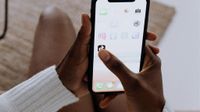TikTok’s latest viral sensation, an AI-generated 'chubby filter' that alters users' appearances to exhibit a larger physique, has stirred a significant backlash for promoting body shaming and exacerbating mental health issues. The stark contrast of this trend stands out in a society increasingly advocating for body positivity and diversity.
Introduced alongside its counterpart, a 'skinny filter,' these tools let users experience firsthand what they might look like if they gained or lost weight. Although the filters are often used humorously, many participants have openly shared their surprise or disgust at their altered images, often accompanying them with captions that belittle their new forms. Discussions about these filters have flooded social media platforms, marking a worrying return to societal norms that stigmatize larger bodies.
Body positivity activists are raising alarms about this phenomenon. “As a curve model, I’m extremely passionate about celebrating every version of myself,” remarked Bedi Othow. She critiques the 'chubby filter' for implying that a larger body is an inferior version of oneself. “What it represents is the version of me who radiates confidence in who she is as a whole person—not just how she looks,” she added, reflecting a push for broader acceptance across body types.
Shauna, a content creator, echoed these sentiments, stating that the 'chubby filter' reinforces a culture of body shame. "It plays into deeply ingrained societal biases, perpetuating the harmful belief that larger bodies are inherently undesirable or comedic," she explained. These sentiments resonate deeply with many users who have faced ridicule for their size, among them Dr. Simon Wilksch, a clinical psychologist who specializes in eating disorders. He described the filter as “offensive and disturbing,” highlighting its ability to mock and devalue individuals based on their appearance.
The implications of such filters extend beyond mere self-image to encompass broader societal issues. Research has shown a staggering link between body image and mental health. A recent UK Government report indicated that 80% of those surveyed reported their body image negatively affecting their mental health. Furthermore, 61% of respondents affirmed that their physical health was adversely impacted. In a staggering statistic from the Mental Health Foundation, 31% of teenagers reported feeling ashamed or depressed due to their body image, a sentiment echoed by a significant majority of women who felt similarly negative about their self-perception.
In this context, the backlash against the 'chubby filter' has gained momentum. TikTok users have taken a stand against the negative impact of these trends. One user, Sadie, with a following of 66,000, expressed her discomfort vocally on social media, stating, “I just don’t feel like people should be ridiculed for their body just for opening an app.” Her remarks resonate with many who feel targeted and demeaned by the viral trend.
Critics are now calling for an outright ban of the 'chubby filter,' arguing that it belongs in a vault of outdated practices that prioritize harmful stereotypes over inclusive representation. The need for internal action from TikTok is echoed by numerous voices within the community who feel betrayed that the platform allows such damaging content to flourish.
Demi Lynch, founder of Faternise, witnessed an influx of fatphobic comments following her critique of the trend. “I wasn’t surprised to see the ‘chubby filter’ trending… society’s distaste towards fatness has never left the zeitgeist,” she stated, reinforcing the need to address deeper cultural issues that permit this negative framing of body diversity.
Critics have not confined their disapproval to social media; mental health experts are weighing in on the urgent issues surrounding societal values tied to weight and appearance. Danni Rowlands, head of prevention at the Butterfly Foundation, warned that the trend reinforces harmful stereotypes and ideals. “It’s making fun of people in larger bodies, fueling stigma, and making it so much harder for people to see their bodies as worthy of dignity and care, regardless of size,” she noted.
The continued prominence of appearance-based filters may facilitate a dangerous shift back towards glorifying narrow body standards, as Dr. Wilksch points out. The tendency to ridicule and shame those that fall outside these ideals can deepen the distress around body image issues, especially among young audiences who are still navigating their identities.
The dialogue surrounding the 'chubby filter' emphasizes an urgent need for reassessment. Advocates like Nina, a TikTok user from north Wales, echo the sentiment that platforms should take a stand against body shaming: “If a filter is clearly offensive, it should be removed.”
As TikTok faces the pressure of both user backlash and expert critique, it is imperative for them to re-evaluate how these filters are presented and the potential harms they perpetuate. The platform has released statements affirming its commitment to removing content that promotes unhealthy body images and harassment but the question remains: is it enough?
The 'chubby filter' serves not only as a digital reflection of societal attitudes but also as a probing question about how deeply ingrained the stigma around body size remains in our culture. In a time when inclusivity should reign, the emergence of such a trend signals a need for collective awakening. The battle for body acceptance continues, but as community voices grow stronger, there is hope for real change.




